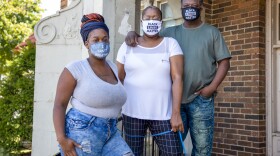For several days in a row, Sgt. Lance Dardeen’s squad car was the only transportation an Indianapolis man was comfortable riding in.
The two went to the grocery store, doctor’s appointments and ran errands around Central Indiana, making small talk, side by side in the front.
Dardeen says the man has schizophrenia and was afraid of leaving his house and going anywhere also. He did not have groceries.
“He was very comfortable with me because I was protecting him as I was able to take him grocery shopping because he would only get [in] a marked police car,” Dardeen says. “That's how scared this individual was.”
It is a typical run for Dardeen as a member of the Indianapolis Metropolitan Police Department's Behavioral Health Services Unit.
'Barriers to success'
Formed in 2015, the unit assigns a behavioral health detective to every district except downtown, each partnered with a master’s level clinician from the Sandra Eskenazi Mental Health Center. The detectives are dispatched for non-emergency events when someone may be experiencing a mental health crisis.
“Individuals that may be having barriers to success,” Dardeen says. “They maybe have had multiple relapses and maybe their family is frustrated and they're just kind of struggling with their mental health.”
Detectives in the unit are trained to speak in calm, non-threatening voices, look for signs of anxiety such as rapid breathing, shaking and fast talking, and identify triggers that could make someone with mental illness nervous or scared.

The goal is to always seek to de-escalate a situation with empathy, Dardeen says.
“I think that word is thrown around so much,” he says. “If we can really see with the eyes of the other and listen with the ears and feel with the heart of another, then I think we're going to start out on a good foundation.”
The police department also has the Mobile Crisis Assistance Teams program, which was launched in 2017. First responders are trained to handle active, emergency calls involving people with mental health, behavioral or substance abuse issues.
Both programs aim to pair people with social services instead of heading down the path toward incarceration.
The crisis assistance teams program “is fulfilling its mission to divert residents in mental health and substance use disorder crises away from the jail,” Eric Grommon, interim director of the Center for Health and Justice Research at Indiana University, said in an email.
In an initial report to study the program's effectiveness, Grommon said the program has only a 2% arrest rate. Two-thirds of the teams' runs freed up police and the Indianapolis Fire Department to answer other emergency calls.
Grommon said researchers were not able to compare how emergency calls for service involving residents in either mental health or substance use crises were managed without the team services. They hope to be able to share preliminary findings next year.
Sgt. John C. Perrine, a spokesperson for the Indiana State Police, says troopers also rely on the teams' services for calls that may involve people in distress.
“They've been very helpful on some of those situations when we know we're dealing with a certain mental illness or disability,” he says. “The more tools we can add to our toolbox, the better equipped we're going be to deal with any situation that arises.”
Though there is no specific crisis training program for the state police, Perrine says seven troopers are set to undergo crisis intervention training to become certified in November.
Training for empathy
Dardeen says every Indianapolis police officer goes through an eight-hour mental health first aid course. Also, 40 hours of crisis intervention team training are offered on a voluntary basis twice a year.
When it comes to a recent social movement to reallocate police resources to better serve community needs, Dardeen says he spends time thinking about how to address calls to defund militarized police efforts.
“I do get asked that,” he says. “I think agencies and local governments are trying to figure out exactly how that's going to look. Would I like to have more teams out there on an active basis? Yes, I would. But I hope people realize it's going to take time to do that because we want to do it in the right way.”
State and local governments spent $115 billion on policing in 2017, according to data compiled by the Urban Institute.
Dardeen says he tells community members to also be intentional in asking for help.
“We tell family members that if you have to call 911 for maybe a behavioral or mental health emergency, ask specifically for that [crisis intervention] officer,” he said. “[We really have] time and patience.”
This story was reported as part of a partnership between WFYI, Side Effects Public Media and the Indianapolis Recorder.




